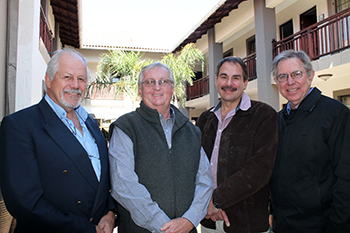DiMTEC and insurance industry join forces to address the vulnerability of communal and commercial farmers

At the workshop on index-based insurance for the
agricultural sector were, from the left:
Dr Andries Jordaan, Johan van den Bergh,
Bertus Kruger and Henk Vermeulen. |
The United Nations identified climate resilience as a major focus for future development to ensure a safer world for all. Tailor-made insurance and financial products ought to address the needs of the most vulnerable.
Recent research done by the Disaster Management Training and Education Centre for Africa (DiMTEC) at the University of the Free State on the vulnerability of communal and commercial farmers to external shocks highlighted the importance of insurance as an important disaster risk transfer tool. Insurance is generally unavailable to most vulnerable groups, such as communal farmers, small-holding farmers, and new commercial farmers.
For these reasons, DiMTEC invited the insurance industry and other experts to a workshop with the purpose of investigating the development of risk transfer products, especially for drought. They were the hosts of a workshop entitled “Global Resilience through Insurance and Index-Based Risk Transfer Products (IBRTP)”.
Bertus Kruger from Agriseker and Johan van der Berg from SANTAM, together with other experts, attended the workshop facilitated by Dr Andries Jordaan, Head of DiMTEC.
The group attending the workshop, agreed on the following:
- Establishing a UFS-DiMTEC-led research team to investigate the feasibility of index insurance products.
- Mobilising government support to develop risk transfer products for the most vulnerable.
- Initiating forum discussions on risk transfer products.
- Promoting collaboration between the private sector, government, and research institutions with the focus on resilience-building through financial and insurance products.